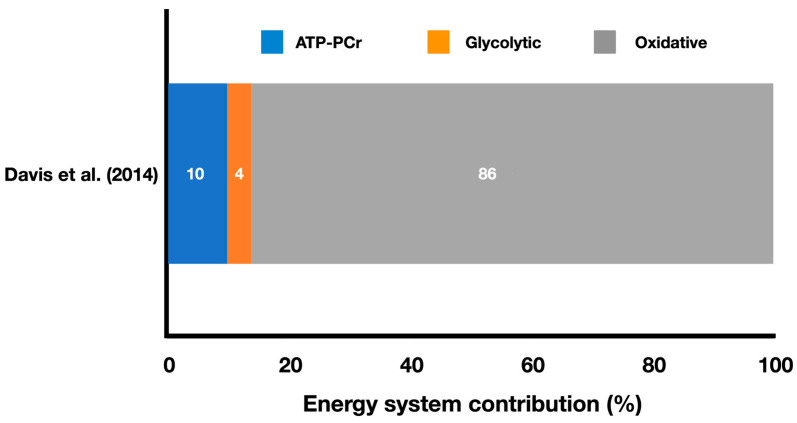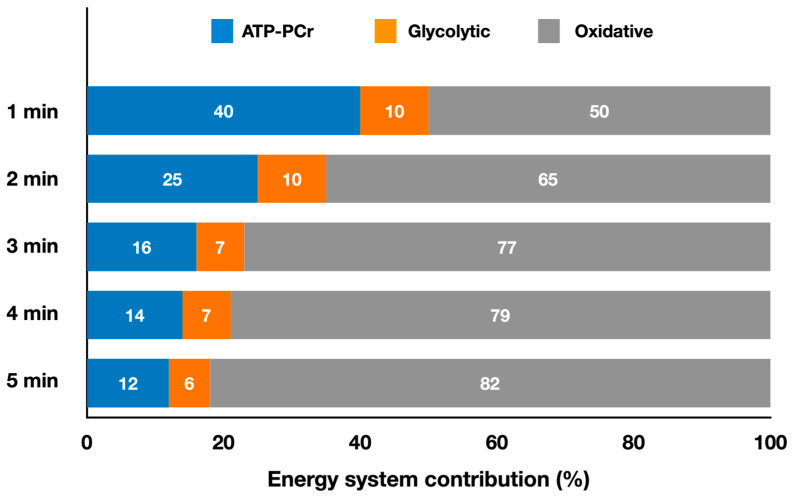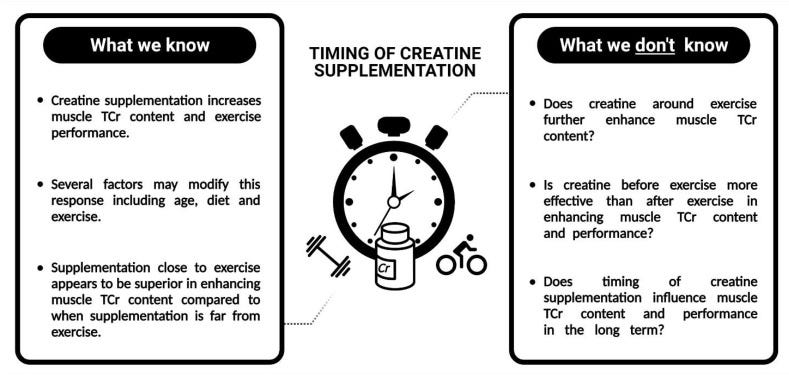Carnivore, Combat Sports, and Creatine?
Review of supplemental creatine benefits and considerations for a carnivore / animal-based diet.
Creatine is one of the safest, cheapest, most studied supplements on the market. Here I’ll take a look at what the mounds of literature say about it and give my thoughts on whether or not or when it may be applicable on a carnivore or animal-based diet.
Introduction:
Creatine aids with ATP (cellular energy) resynthesis. It’s an endogenous substance made in our body from the amino acids:
Arginine,
Glycine, and
Methionine.
If you search “creatine” on PubMed, you get over 2,000 results published within the past year, 9,000 in the past 5 years, and 17,000 in the past 10 years (ref.).
The circulating supply of creatine in a 70 Kg athlete is about 130g (ref.). Standard reference ranges for bodily needs of creatine are generally 3 - 5g / day, but “larger athletes engaged in intense training” may need 5 - 10 g / day (ref.).
Let me again specify for the purists — who, in their discontent, always seem to find something to nag about — I’m not a pill-and-potion jockey. Let us be reminded that (A) a lot of people claim to “feel normal” on a Standard American Diet, (B) “do fine” on (insert dogmatic diet name) seeking confirmation bias, and (C) that “not needing” something isn’t the same as “not receiving any benefit from it.”
Literature Review:
Some of the benefits of creatine supplementation are improved strength, resistance fatigue, gaining muscle mass, improved athletic performance, and improved cognition and mental acuity.
Performance & Fatigue Resistance:
Creatine studies have shown improvements in fatigue resistance during repeated vertical jumps (ref.) and repeated 30-second knee extension intervals (ref.).
However, it’s unclear whether these effects are more attributable to the supplement or consistent, repeated, progressive overload in general (e.g. strength training) (ref., ref.).
Also of interest, adding carbohydrates to creatine provides no additional benefit to creatine alone during Wingate tests (ref.).
Mental Fatigue & Cognition:
Supplementing creatine at 8g / day reduced mental fatigue during “simple math” tasks in one study (ref.). Additionally, in rats, creatine has been shown to “alleviate homeostatic sleep pressure”; that is, combat the negative cognitive effects of sleep deprivation (ref.). Similar results were found in humans after 24-h sleep deprivation, during which creatine supplementation also improved mood (ref.).
However, the physical benefits of creatine (above) don’t appear to carry over into conditions of sleep deprivations (ref.); again reminding us how important sleep is for performance.
Side Effects:
The most noted side effect of creatine supplementation is water retention (which contributes to “lean mass”). However, this is partly because of how creatine supplementation works by increasing intermuscular concentrations (“saturation” level) of creatine.
In the short term (less than one week) of “creatine loading” there may be notable increases in water retention, but this does not seem to be the case with long-term use (ref.).
Other claims such as hair loss (due to DHT production) and dehydration have also been debunked (ref., ref.).
In Carnivore(ish) Land:
Shawn Baker doesn’t use any supplements and that includes creatine. However, he also eats 4 lbs. (or more) of ribeye/day. That’s about 8g of creatine and over 5,000 calories — something we’ll come back to.
I don’t mean any ill will towards Shawn. He and I just have very different body types, so it makes for an interesting comparison.
Shawn’s a significantly larger human than I am. The sheer volume of food he consumes daily isn’t the same as me and therefore conversions of creatine (or sugar from gluconeogenesis for that matter!) aren’t the same either.
Moreover, do you have any idea how freaky I’d look if his 250 lb body was condensed to my 5’8” frame or if a 6’5” dude was walking around at 5.5% body fat?
James DiNicolantonio, while not a carnivore, is certainly well known in the ancestral health space and has a lot to say about creatine in his book Win:
“Short-term creatine monohydrate supplementation improves maximal strength and power by 5 - 15%” (p.376)
“International Society of Sports Nutrition recommends 0.3g / Kg/day for 3 days and then 3-5g / day after” for dosing (p.378)
To maximize creatine retention, consume with carbs and protein (p.378) See above.
Side effects may include water retention and possible hair loss due to increasing DHT levels which is associated with hair loss. (p.380) See above.
Reference Ranges & Dietary Sourcing:

DiNicolantonio follows the standard recommendation of 3 - 5g / day but contends that that amount would be hard to get from diet alone. Other recommendations have been notably higher:
Dietary sources are generally meat/animal products; chicken has about 0.5g of creatine / 8oz raw and beef has about 1g of creatine / 8oz raw (ref.).
One could also look at food concentrations of the amino acids that make creatine (methionine, glycine, and arginine), and beef still comes out ahead of pork and lamb (ref.).
There is also some speculation about whether it is better to take creatine before (as an ergogenic aide) or after a workout (as a recovery aide) (ref., ref.).
Energetics and Metabolism (in Combat Sports):
It turns out that cellular respiration is actually kind of complicated. There isn’t a clear conversion rate of, say %V02max, that easily translates to ATP consumption the way “The Crossover Effect” occurs with glucose and fat metabolism.
Approximately, at any given time our muscle tissue can store enough ATP to fuel about 15 seconds of 75% VO2max activity or 2 seconds of 300% VO2max activity (ref.). Similarly, another study showed that ATP metabolism slowed significantly after 10s efforts (ref.).
While creatine may help offset lactic acid buildup as ATP is resynthesized, building a more robust aerobic foundation would likewise improve the efficiency of clearing waste products (ref., ref.) — e.g. recoverability depends on oxygen mobilization which depends on aerobic endurance.
Mixed Martial Arts is extremely complicated and requires a high degree of proficiency in a wide variety of skills and attributes. Its subdomains of grappling and striking rely a little more heavily on glycolytic/lactic vs. aerobic systems respectively; while both require bouts of explosiveness (ATP)(ref.).
For BJJ, a 2021 study (ref.) estimated the energy contributions of a 6-minute sparring round at:
77% energy from the aerobic system,
17% energy from the glycolytic system, and
6% energy from the phosphate system.
What this means is that (A) endurance is still the foundation for everything, (B) the more isometric holding involved (grappling / wrestling / BJJ), the more sugar is used for fuel, and (C) all combat sports have repeated bouts of explosiveness that use ATP-creatine fuel to varying extents.
Testing for Myself:
There’s a huge range of recommendations; at 77 Kg or 170 lbs, I should be getting 3, 5, or 8g of creatine/day. This makes a huge difference when we’re talking about calories accompanying food sources alone:
3g of creatine = 1.5 lbs of beef (1,500 calories)
5g of creatine = 2.5 lbs of beef (2,500 calories)
8g of creatine = 4 lbs of beef (4,000 calories)
If I’m building (at 175 lbs) and eating 3,500 calories/day then I may be getting enough creatine. However, if I’m cutting at 165 lbs and eating 2,500 calories/day, I’m on the low-middle end of around 5g of creatine/day.
Most aggressive recommendation: 0.1g / Kg / day
7.5g / day at 165 lbs. recommended.
165 lbs. > 2,500 calories / day > 5g creatine consumed.
7.9g / day at 175 lbs. recommended.
175 lbs. > 3,500 calories / day > 7g creatine consumed.
Additionally, like the carnivore and carbs debate, gross intake (cumulative throughout the day) isn’t the same as intermittent demand (e.g. pre-training).
In addition to considering overall mass (body weight) and dietary intake (calories/lbs of meat), we also need to consider the training modalities discussed above:
Explosive muscle contractions lasting < 10 seconds (may benefit from supplemental creatine); this may include interval training, but…
If the training stimulus is hypertrophy, volume, or lactic acid (clearance) related, where single contractions last more than 10 seconds each, pre or post-workout carbs may be a better ergogenic or recovery aide.
There’s little to no benefit in using creatine during aerobic training. Even at high(er) intensities the glycolytic pathway will be activated long before ATP is used.
Preliminary Conclusion:
Overall, there don’t seem to be many downsides to creatine supplementation. It is conceivable that given one’s state of calorie restriction and training modality that even on a carnivore diet they are getting a less than optimal creatine intake from diet alone. However, the specific conditions mentioned above must be met and recommended intakes vary widely.
I’ve been fortunate to be offered an “ambassador” role with Animal Pak so that I’ll be able to do more formal testing. However, even at your own expense, a 5g serving of creatine is less than $0.50.
In my opinion, there is at least enough literature support to do some n-of-one testing for yourself and see what happens. It’s also important to remember that if a “placebo” has a “significant effect” (p < 0.05), then it is still an effective intervention that produced change and results!
Stay tuned for more!
#builtnotborn










